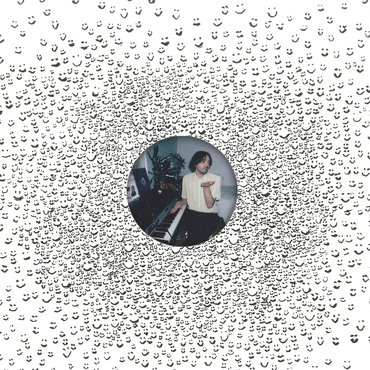by Benji Heywood (@benjiheywood)
Living in Los Angeles is every bit as terrible as you think. Choked with cars, pollution, and dense urban sprawl, Los Angeles is the type of place where every friendship is transactional, and every transaction is self-serving. But here’s the worst of it: even knowing that every human interaction is a measure of who can get what from whom, each exchange must be further condensed to the most infinitesimal timeframe possible. What’s the elevator pitch? Oh, how my heart dies when I overhear someone say this. Problem is, great, affecting art cannot be condensed into, say, one hundred forty characters or a snappy marketing tag. If it’s advertised on television, it’s probably not great art.
A friend recently asked me to give them the elevator pitch of a review I was writing about Flickering i, the debut solo project from Astrel K, aka singer-guitarist Rhys Edwards of Ulrika Spacek. There really isn’t one, I replied, and that’s a good thing.
Flickering i is a strange and addicting album. Listening feels like watching as someone makes a thing piecemeal in front of you. Listening feels like a bike ride along the Amstel or like sitting on a porch, the air heavy with humidity, and watching the sky turn green right before the tornado sirens peal. Listening is like the feeling of being tailed by your own ghost.
These metaphors for Flickering i may sound esoteric, but they’re reasonable descriptions after a few listens. Released by Duophonic – the label associated with Broadcast, Stereolab, and Yo La Tengo – Astrel K’s Flickering i sort of sounds like all those bands and not really like any of them at the same time. Album opener “Is It It Or Is It I?” reflects this perfectly. What starts as a smartly dressed, breezy pop tune plucked from a Wes Anderson film ultimately becomes a post-rock pummeler of off-kilter riffage.
This metamorphosis happens time and again throughout the album’s perfectly suited 38 minutes. What you think is one thing turns out to be another. The waltz-y “You Could If You Can” alternates between sunniness and dissonance. “Clicktivism” is both soft and sharp, with time signature quirks, syrupy synths that sound like guitars, and bright guitars that sound like synths. Album highlight “Clean Coal” is a patchwork of click-clack krautrock and fuzzed-out banger. “Morbid Clinging” uses sound collage and the beeping of a heart monitor as a backdrop to the album’s most delicate and gorgeous number. The most-compelling instrumental award goes to “Forwardmomentum,” which blooms and busts in a gauzy soundscape of incandescent cymbals, muted orchestral strings, and freak-out trumpet squawks. From start to finish, Flickering i surprises and delights.
The project’s origin story partially explains its seemingly multi-polar music. Edwards used to live in a shared house with the rest of his Ulrika Spacek bandmates in a rapidly-gentrifying East London neighborhood. When they lost the house, Edwards did what any reasonable band person seeking more affordable cost of living would do: he moved to Stockholm and made an album by himself.
Recalling the move, Edwards said, “At this time, I didn’t really know anyone in Stockholm so (I) kinda retreated into making music just by myself. The album title definitely reflects this period; I was on my own making music and sometimes nothing would be happening and sometimes there would be little sparks of ideas that could keep me going.”
This quote is instructive to understanding the music of Astrel K. Flickering i is the sound of a person discovering what the sound is in real time. It’s somewhat ironic that the album’s title track is possibly its most straightforward. “Is it my conscience soaking on nonsense,” sings Edwards in his pleasant hush, “I can’t figure it out myself/Is all the commotion part of the process.” And elsewhere, admitting there’s “no sense of certainty.”
The lyrics, paired with the sonic choices, suggest the album should be considered an active artwork, a search party still looking for the little lost child at its center. The joy of Flickering i is being a part of the search. As listeners, each new tune promises the unexpected, despite an intentional album format of more traditionally-structured songs interspersed with meditative instrumentals. We may never find what it is we’re searching for, but that’s not really the point.
Does Astrel K sound like Ulrika Spacek? Yea, sure it does, but Edward’s work here is more inquisitive, playful, and frankly, more rewarding than even that band’s best moments. This is perhaps due to Astrel K being a thing undefined. The more one listens to Flickering i, the less one understands it as something static. It’s a grower that reveals more and more on repeat listens.
In this way, the album is quite like Los Angeles (there’s your elevator pitch). After twenty years here, you realize, it’s the smog that gives you the nuclear-blast sunsets and the one-of-a-kind light of golden hour. It’s the dense sprawl that provides you the opportunity to continually discover new neighborhoods with rich cultures, and the traffic… Well, I suppose it provides you the opportunity to listen to an album on repeat. I humbly suggest Flickering i be that album, regardless of where you live.

